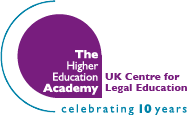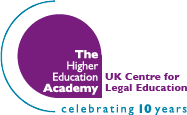Search
Pages (30)
Equality and assessment in law
research into issues of achievement and equality, discussing assessment methods and their impact on non-traditional students. Melanie and Simon’s slides are embedded below, and their full paper appeared in the Web Journal of Current Legal Issues 2009(3) in June 2009. I…
Widening participation in legal education
Latest news and resources Developing and embedding inclusive policy and practice in higher education – a research report produced by the Higher Education Academy in February 2010 Unleashing aspiration – the government’s response to the report of the…
Accessibility in law schools: learning, teaching and assessment
all of these conducive to the provision of equality of opportunity, or are there reasonable adjustments which can be made? The possible tension between compliance with the legislation and meeting the requirements of the law benchmark statement and the professional bodies raise…
LILI 2003 panel discussion
participation – the picture in law, equality of opportunity and access to legal education and training, and implications for learning, teaching and assessment processes and practices quality assurance – focusing on developing a more sophisticated understanding of w…
Papers presented at 2009 Conference
Audrey Guinchard (University of Essex) Equality and assessment in law – Melanie Crofts & Simon Sneddon (University of Northampton) Facing the challenges of transition to legal education while engaging the learner – Alison Bone (University of Brighton) Beyon…
Dyslexia in the learning of law: its meaning and its impact on student and teacher
their difficulties, thus ensuring greater equality between the dyslexic and the non-dyslexic students. The particular difficulties experienced by law students with dyslexia lie in the quantity of reading material they have to cope with, and the difficulty with recall of cases …
Traffic lights and responsibility to the profession
were explored in the discussion included: Equality of assessment: How do we ensure there is consistency of approach between providers? How many legal issues should there be in an assessment? How do we weight the marks to different ‘red light’ errors within…
Accessibility in law schools: resources
Disabilities (GSD) – aims to achieve equality of opportunity for people with disabilities, and aims to address the barriers faced by students with disabilities sitting or studying for the professional examinations or seeking employment in the profession. Codes of pract…
UKCLE networking
UKCLE works with a number of associations, networks and interest groups. Our targets for networking include: development of links within the UK and internationally development of expertise/groups around priority areas support for cognate organisations and networks De…
Understanding good teaching: what do students say?
movement of person’s law, EU citizenship, equality law and legal education. Edward Mowlam graduated from Bradford University Law School with a first class LLB (Hons) in July 2010. He is providing research assistance on the current project. Additional research interests inclu…
From pupil to professional: is pupillage fit for purpose?
obtaining pupillage with a 2:2 or whether equality and diversity issues affect the ability to gain pupillage. Some basic information is summarised below, with further statistics available from the Bar Standards Board’s statistics section. Numbers of pupillages and Bar …
Assessing students on the Legal Practice Course
published in January 2005. The research, Equality, diversity and the Legal Practice Course, aimed to establish the full extent of any differential in assessment performance and to explore the factors contributing to assessment performance in general. It was conducted in two…
Building the sustainable university
curriculum can be compared to the gender/equality mainstreaming debate, and radical proposals were aired at the symposium, such as a cross-discipline degree with a common first year followed by specialist options (the logical conclusion of which is a Faculty of the Environment),…
A guide to resources on research ethics
Resources on research ethics by Mark Israel and Iain Hay (Flinders University, Australia). Guidelines and codes of practice Professional associations British Educational Research Association – Ethical guidelines for educational research (PDF file) British Psycho…
Making choices about lawyers' ethics: integrating an ethical dimension into a simulation
represent a different means to achieving equality? Ethical questions about ‘identity conscious’ lawyering can also be linked to other aspects of the ‘non-professional identity’ of lawyers, such as gender and sexuality.…
Useful links for law teachers
Business, Innovation & Skills (BIS) Equality Challenge Unit Higher Education Academy Higher Education Funding Council for England (HEFCE) Quality Assurance Agency (QAA) Society for Research into Higher Education (SRHE) Staff and Educational Development Agency (SE…
Enhancing the employability of law graduates
the legal profession has not yet achieved equality of access. Women and ethnic minorities are disproportionately likely to miss out on training contracts and pupillages, and this bias is reinforced at higher levels of the profession. In preparing students at London Guildhall Uni…
Should I choose live client work or simulation?
each student has (so far as practicable) equality of opportunity to fulfil those outcomes. This is relatively easy in a simulation, where you have control over the problems that all students work on. It is a little less easy in live client work, but it is possible through case s…
BILETA research into ICT provision in law schools
for most students. Thus the quality, and equality, of student access to intranets could well become the focus of attention in the future, calling for improved security procedures and more efficient, user friendly, authentication processes. The introduction of managed learning en…
Dealing with difference: supporting neuro-diverse learners in law
student? A suggestion put forward was to offer equality training as part of the university induction process, part of the institutions’ equality agenda. Is a peer buddy system an effective tool? Student who is very disorganised – hands in non-assessed work late, po…
Legal directions in Wales: an interview with John Griffiths AM
decide how we might go about ensuring better equality of opportunity for all sections of society in Wales. Looking at the grades required of working class students to get into law school is one part of it, but there are big questions about how open and accessible the professions…
Journal articles on Islamic law
(2003) ‘Freedom of religion versus equality in international human rights law: conflicting norms or hierarchical human rights? (A case study of Pakistan)’ Nordic Journal for Human Rights 21 Ali S (1999) ‘Rights of ethnic ,inorities in Pakistan: a legal analys…
Legal education in Scotland
Resources and news Moving forward: legal education in Scotland – reports and resources from the 2010 UKCLE conference Law Awards of Scotland – 16 September 2010, Glasgow New lawyers essay competition 2010 – organised by the Law Society of Scotland for…
Access to legal work experience and its role in the (re)production of legal professional identity
widespread endorsement of diversity and equality strategies, access to the legal profession remains unequal, with class in particular a crucial mediator of entry. This raises important questions about recruitment practices and the profession’s conceptualisation of merit. Wor…
Glossary of Arabic terms
generation K: Kaf’a‘ah – equality in marriage Kafala – to take care of; the concept is comparable to the western concept of adoption, albeit with some important differences Khalifa – caliph Khiyar-u-l bulugh – option of puberty Khula &#…
Back to the future - not rocket science: some thoughts on 20 years of consultations on the future of the BVC and pupillage
that the working group accepts social inequality, but that they “want to improve the present situation as much as possible” and “that must be the target”. They want “the best entrants from all backgrounds”. These are excellent principles, espe…
How can we respond to ethical problems?
honesty, trust, individual autonomy, fairness, equality and recognition of social and environmental vulnerability. In some instances, some principles may be regarded as more important than others. Make your own decision and act with commitment – it is important to integr…
Examples of good practice in recruitment and retention
intake, and there is clear evidence of inequality of access to a medical career for students from socially disadvantaged groups. Competition for places at medical schools is fierce and the recruitment of students from less affluent backgrounds is rare. Part of the scheme is a pa…
Legal education in the UK
clients without fear or favour, to promoting equality of opportunity, and to ensuring that adequate legal services are provided for those who cannot afford to pay for them professional skills – learning to act like a lawyer, involvings a combination of knowing how to con…



Comments
There are no comments at this time